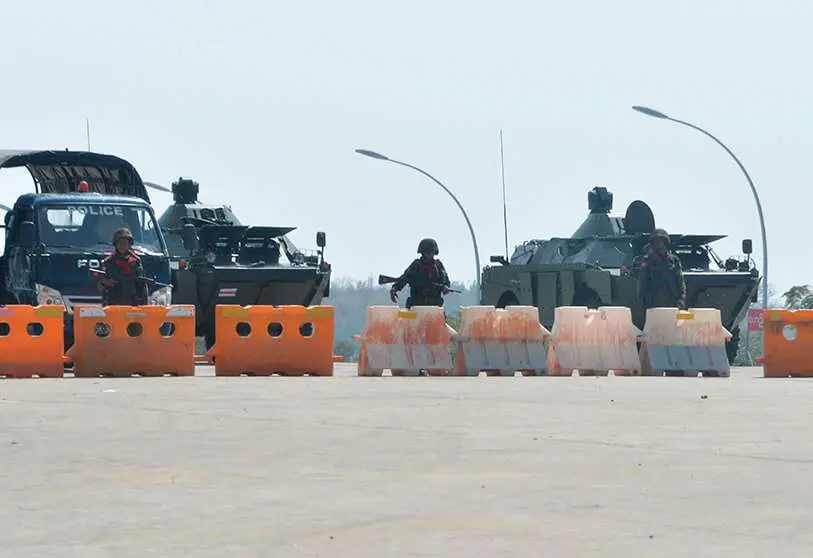Coup in Myanmar

One thought that traditional coups d'état, with military and sabres, belonged to the past, to the 19th century or the 20th century in Latin America and Africa, although in Spain we have the shame of having suffered two in that century: that of 1936 and the frustrated attempt in 1981. Today, coups are carried out in a different way, from within power and in the name of the very democracy they seek to destroy, as happened in the Catalonia of the illegal referendum and the "disconnection laws" of 2017 sponsored by the Generalitat, or in the recent attempt to take over the US Capitol by masses of people encouraged by the president himself.
That is why what has just happened in Myanmar is like a return to the past because there the army chief, General Min Aung Hlaing, has staged a coup d'état of the old-fashioned kind, the kind where the army is paraded through the streets in flag-decorated trucks, airspace is closed, television broadcasts patriotic music, the internet and mobile phone connections are shut down, and the government and other political and parliamentary leaders are detained. The army has declared a state of alarm and announced that new elections will be held in a year's time, which the military itself will supervise to ensure that there is no massive fraud as they claim there was in last November's elections. In those elections, which were held in a fairly free atmosphere, the National League for Democracy party led by Aung San Suu Kyi, the daughter of the assassinated independence hero and founder of the army, swept the board. She received the Nobel Peace Prize in 1991 for the dignity and gallantry of her peaceful, Ghandi-esque opposition to the military juntas during 15 years of house arrest when her marriage to a British citizen would have allowed her to leave the country.
For Myanmar, formerly Burma, has lived under a permanent military dictatorship since the uniformed military seized power in 1962, a few years after independence. Since then, the military has taken control of the country's wealth and constitutes a veritable state of privilege and wealth within a state of privilege and wealth within a state that is as picturesque and beautiful as it is poor, full of weapons, barely able to feed itself and with strong racial tensions between the many ethnic groups that live there, and also between the two dominant religions, Buddhism and Islam.
After many years of dictatorship, international pressure led to elections in 1988, which were won by the League and not recognised by the military, which came under increasing international pressure. This led to another election in 2015, the results of which this time were accepted by the military caste, which allowed a civilian government but reserved key ministries, economic control and 25% of the seats in the new parliament. Despite this, the world welcomed this step with the hope that it would allow the country to advance along the democratic path, albeit gradually and carefully. What has just happened shows that we are naïve and that the military is not willing to lose the power and privileges it enjoys.
It is true that the last few years have not been easy. Myanmar has attracted global attention when in 2017 religious disputes between Buddhists and Muslims resulted in massacres and indiscriminate rapes and the burning of villages of the Rogingya ethnic group, 750,000 of whose members had to seek refuge in neighbouring Bangladesh under very precarious living conditions. The Burmese military, and in particular the current coup leader General Min, was blamed for atrocities that some have described as genocide. The leader Aung San Suu Kyi made many a feather at the United Nations in Geneva by pledging her prestige in rejecting such accusations against her country's military. The matter is not closed, investigations continue and the Rohingya are still living in refugee camps and unable to return to their country. Their situation does not seem to be improving after the recent events.
The coup was a foregone conclusion, diplomats in Yangon had been announcing it for weeks, and the rumours were echoed by the United Nations itself last week. Antonio Guterres, its secretary-general, has deplored what has happened as a "serious blow to democratic reforms in Myanmar" and the generals would not have done so had they not had China's back.
Because China is Myanmar's largest trading partner, buys 33 per cent of Myanmar's gas exports and offers an alternative growth model to liberal democracy that does not intervene in the internal affairs of countries under the pretext of human rights. The two countries have grown closer since Xi Jinping's visit to the new Burmese capital Naipyiró last year on the occasion of the 70th anniversary of the establishment of diplomatic relations between the two countries, when they affirmed that they are part of "a community of destiny". Some 30 agreements were signed on the occasion, strengthening the "Sino-Burma Economic Corridor" with roads, railways, electricity grids and tourism development, as part of Burma's participation in the infrastructure network created by the Silk Road. This goodwill has been reinforced by Beijing's support for Myanmar during the Rogingya crisis, while Western criticism was mounting, and then by China's support over the past few months to combat the impact of the Covid-19 pandemic that has hit the country's fledgling tourism industry very hard.
I am convinced that the Burmese generals would not have staged this coup if they did not have the guarantee that China would have their back... in exchange, that too, for greater dependence on the Asian giant.

